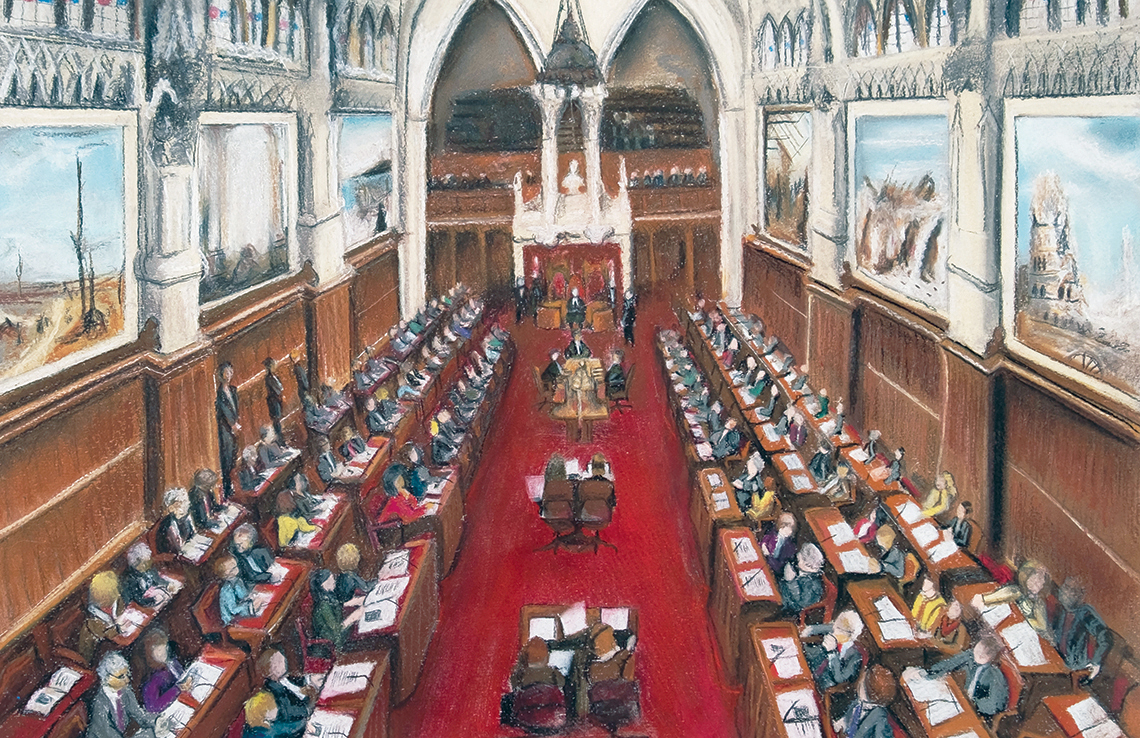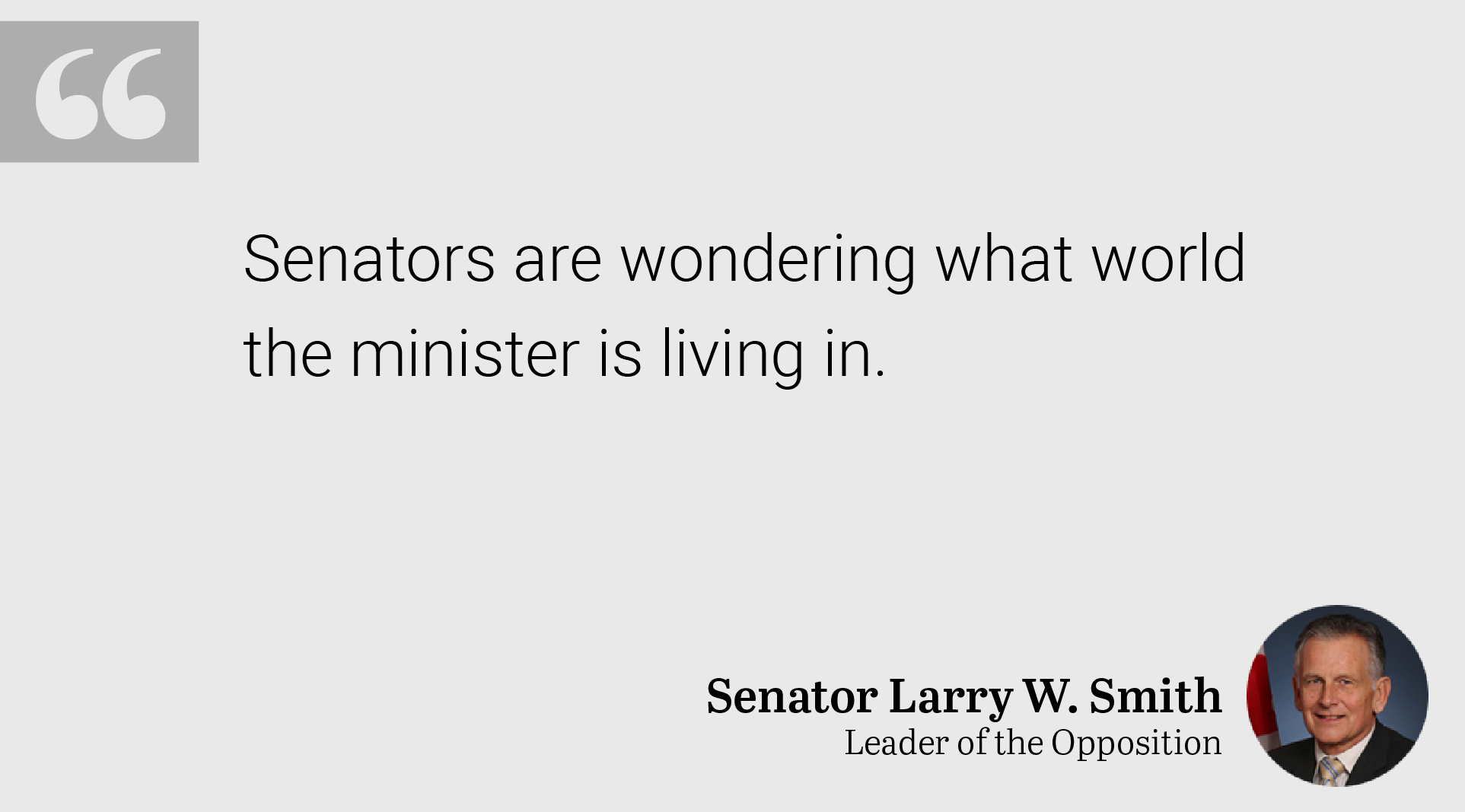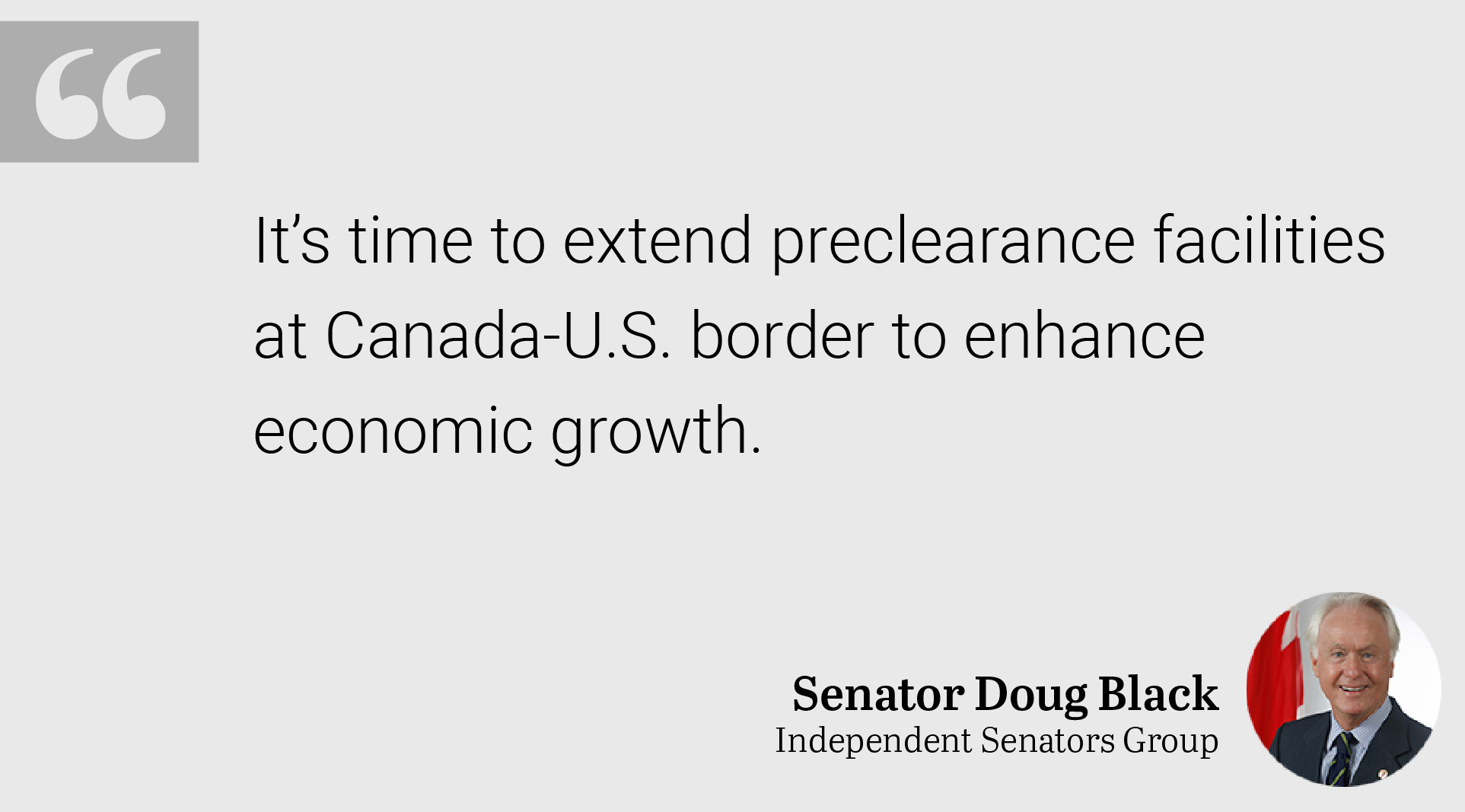Perspectives — October 31 – November 2, 2017

Tags
This week at the Senate: The government’s finance policies and bills on reforming the Indian Act as well as the Canada-U.S. border.
Government
This past week Bill C-49 received first reading in the Senate. The bill proposes to make amendments to the Canada Transportation Act (CTA) and other related transportation acts. These amendments would allow the government to move forward with initial measures in support of Transportation 2030 - A Strategic Plan for the Future of Transportation in Canada, announced by the minister of transport in November 2016.
Transportation 2030 is an integrated, national strategy aimed at delivering a safe and innovative transportation system to support Canadian travellers, trade and economic growth, a cleaner environment, and the well-being of Canadians.
As the sponsor of Bill C-49 in the Senate, I plan on speaking to the proposed legislation at second reading. In my remarks, I will outline how C-49 represents an important first step to provide Canadians with a safer, more reliable and efficient transportation system to better facilitate trade and travel.
Among other things, C-49 is designed to help strengthen Canada’s air passenger rights. The bill would establish clear standards of treatment for air travellers in common situations as well as financial compensation under certain circumstances. Like most Canadians, I share the belief that air passenger rights should be clear, consistent, transparent and fair for passengers and air carriers.
Overall, the changes proposed in Bill C-49 would respond to the needs of Canadians and their expectations for services, and allow Canada to take advantage of international opportunities and generate economic growth. I will be encouraging my Senate colleagues to support this important bill.
Opposition
It was another dark week in economic news with little reaction from the Trudeau government.
The Parliamentary Budget Officer released a financial update. The report concluded that economic growth will slow in the coming year. Consumer spending will be moderate and residential investment will continue to decline. The PBO stated: “We project real GDP growth to slow from 3.1% in 2017 to 1.9% in 2018 and then to 1.8% in 2019 before averaging 1.7% annually over 2020 to 2022.” The report also noted delays in planned infrastructure spending. Instead of continuing to raise taxes on hard-working middle-class Canadians, the Trudeau government should be working to grow the economy and focus on getting their programs working to employ and improve the lives of Canadians.
Finance Minister Bill Morneau agreed to appear before the Senate Committee on National Finance. However, senators were incensed to find out that there was no economic analysis done on the proposed small business tax changes to determine their impact on Canadian small business. The minister stated: “We don’t see the world the way you’re suggesting.” Senators are wondering what world the minister is living in.
Economic expert Dr. Jack Mintz told the committee the impact of the proposed tax changes on corporate efficiency will reduce competitiveness in comparison with the US. The excessive 73% tax rate on corporate income will increase inefficiency; Canadian small businesses are already taxed higher than those in the US.
Senate Liberals
Last week, I continued to press the Government Representative in the Senate, Senator Peter Harder, about the lack of movement on Bill S-3: An Act to amend the Indian Act (elimination of sex-based inequities in registration). This legislation has been mired at message stage since the House of Commons sent it back to the Senate in June, having removed the Senate’s amendment that would eliminate gender discrimination completely from the Indian Act.
Changes previously made in 1985 meant that only a sliver of women and children were reinstated under the Indian Act. Since then, thousands of indigenous women have suffered the indignity of being denied status entirely and being banished from their communities. We have been treated as though we are not truly Indian, or “not Indian enough,” less entitled to benefits and to housing, and we are obliged to fight constantly for recognition by male indigenous leaders, our communities, and broader society. Further legislation passed in 2010 still did not address the gross inequities that remained.
All Indigenous women should enjoy the full protection of the Canadian Charter of Rights and Freedoms, and the Senate’s amendment to Bill S-3 would have guaranteed that protection. Discrimination is discrimination. The federal government must finally accept its responsibility to ensure complete gender equality for all Indigenous women in Canada.
Independent Senators Group
It’s time to extend pre-clearance facilities at Canada-U.S. border to enhance economic growth.
We are a trading nation. While we look to develop other trading partners, we mustn’t forget that America remains our main dance partner.
Canadians clearly support diversifying the markets we do business in, they also know that this country’s fate will forever be tied to the United States.
The Obama and Harper governments struck a deal to further that mutually beneficial objective. They agreed to expand an existing policy of setting up pre-clearance facilities. Bill C-23, seeks to entrench this agreement into Canadian law so that implementing this effective program can begin.
This bill will expand that already-functioning system to new routes and modes of transportation.
Under the terms of the legislation, preclearance facilities can be expanded to American airports as far south as Los Angeles and Phoenix to further enhance the mobility of Canadians coming home. It gives greater economic incentive for airlines to expand the routes they offer to North American air travelers.
It includes marine crossings, which bolsters the movement of commercial vessels and tourist cruises in the Great Lakes or the waters connecting Vancouver and Seattle.
Considering the climate of trade negotiations between our two countries, we don’t want this agreement to stall. The door may close. In truth, we simply wouldn’t get a better deal than what’s on offer now.
But from where I stand, it seems this bill is overwhelmingly in the best interest of the people of this country.
This week at the Senate: The government’s finance policies and bills on reforming the Indian Act as well as the Canada-U.S. border.
Government
This past week Bill C-49 received first reading in the Senate. The bill proposes to make amendments to the Canada Transportation Act (CTA) and other related transportation acts. These amendments would allow the government to move forward with initial measures in support of Transportation 2030 - A Strategic Plan for the Future of Transportation in Canada, announced by the minister of transport in November 2016.
Transportation 2030 is an integrated, national strategy aimed at delivering a safe and innovative transportation system to support Canadian travellers, trade and economic growth, a cleaner environment, and the well-being of Canadians.
As the sponsor of Bill C-49 in the Senate, I plan on speaking to the proposed legislation at second reading. In my remarks, I will outline how C-49 represents an important first step to provide Canadians with a safer, more reliable and efficient transportation system to better facilitate trade and travel.
Among other things, C-49 is designed to help strengthen Canada’s air passenger rights. The bill would establish clear standards of treatment for air travellers in common situations as well as financial compensation under certain circumstances. Like most Canadians, I share the belief that air passenger rights should be clear, consistent, transparent and fair for passengers and air carriers.
Overall, the changes proposed in Bill C-49 would respond to the needs of Canadians and their expectations for services, and allow Canada to take advantage of international opportunities and generate economic growth. I will be encouraging my Senate colleagues to support this important bill.
Opposition
It was another dark week in economic news with little reaction from the Trudeau government.
The Parliamentary Budget Officer released a financial update. The report concluded that economic growth will slow in the coming year. Consumer spending will be moderate and residential investment will continue to decline. The PBO stated: “We project real GDP growth to slow from 3.1% in 2017 to 1.9% in 2018 and then to 1.8% in 2019 before averaging 1.7% annually over 2020 to 2022.” The report also noted delays in planned infrastructure spending. Instead of continuing to raise taxes on hard-working middle-class Canadians, the Trudeau government should be working to grow the economy and focus on getting their programs working to employ and improve the lives of Canadians.
Finance Minister Bill Morneau agreed to appear before the Senate Committee on National Finance. However, senators were incensed to find out that there was no economic analysis done on the proposed small business tax changes to determine their impact on Canadian small business. The minister stated: “We don’t see the world the way you’re suggesting.” Senators are wondering what world the minister is living in.
Economic expert Dr. Jack Mintz told the committee the impact of the proposed tax changes on corporate efficiency will reduce competitiveness in comparison with the US. The excessive 73% tax rate on corporate income will increase inefficiency; Canadian small businesses are already taxed higher than those in the US.
Senate Liberals
Last week, I continued to press the Government Representative in the Senate, Senator Peter Harder, about the lack of movement on Bill S-3: An Act to amend the Indian Act (elimination of sex-based inequities in registration). This legislation has been mired at message stage since the House of Commons sent it back to the Senate in June, having removed the Senate’s amendment that would eliminate gender discrimination completely from the Indian Act.
Changes previously made in 1985 meant that only a sliver of women and children were reinstated under the Indian Act. Since then, thousands of indigenous women have suffered the indignity of being denied status entirely and being banished from their communities. We have been treated as though we are not truly Indian, or “not Indian enough,” less entitled to benefits and to housing, and we are obliged to fight constantly for recognition by male indigenous leaders, our communities, and broader society. Further legislation passed in 2010 still did not address the gross inequities that remained.
All Indigenous women should enjoy the full protection of the Canadian Charter of Rights and Freedoms, and the Senate’s amendment to Bill S-3 would have guaranteed that protection. Discrimination is discrimination. The federal government must finally accept its responsibility to ensure complete gender equality for all Indigenous women in Canada.
Independent Senators Group
It’s time to extend pre-clearance facilities at Canada-U.S. border to enhance economic growth.
We are a trading nation. While we look to develop other trading partners, we mustn’t forget that America remains our main dance partner.
Canadians clearly support diversifying the markets we do business in, they also know that this country’s fate will forever be tied to the United States.
The Obama and Harper governments struck a deal to further that mutually beneficial objective. They agreed to expand an existing policy of setting up pre-clearance facilities. Bill C-23, seeks to entrench this agreement into Canadian law so that implementing this effective program can begin.
This bill will expand that already-functioning system to new routes and modes of transportation.
Under the terms of the legislation, preclearance facilities can be expanded to American airports as far south as Los Angeles and Phoenix to further enhance the mobility of Canadians coming home. It gives greater economic incentive for airlines to expand the routes they offer to North American air travelers.
It includes marine crossings, which bolsters the movement of commercial vessels and tourist cruises in the Great Lakes or the waters connecting Vancouver and Seattle.
Considering the climate of trade negotiations between our two countries, we don’t want this agreement to stall. The door may close. In truth, we simply wouldn’t get a better deal than what’s on offer now.
But from where I stand, it seems this bill is overwhelmingly in the best interest of the people of this country.






